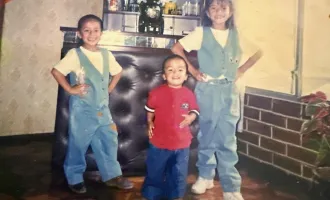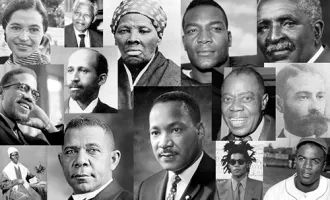
Melanie Tervalon Daumont
This Date in UCSF History: Fiery Med Grad Speech Highlights Failings
Originally published on June 5, 1980.
Like a blood stain that will not wash away, politics marked the recent UCSF medical school graduation ceremony. Speaking before faculty, jubilant graduates and proud families, Melanie Daumont criticized medical education for perpetuating racism, sexism and classism and transforming socially conscious medical students into conservative, insensitive physicians.
Daumont, a Black graduate, delivered a commencement speech which drew a standing ovation from some in the UC Berkeley auditorium, while others responded with stone silence and nervous fidgeting.
Though the speech may have shocked some visitors, it didn’t raise any new issues in the UCSF community. More than anything else, reaction to Daumont’s speech exposed the existing political polarization among UCSF faculty and students.
Daumont characterized herself as representative of a group of “minorities, women (and) individuals from working class families admitted to medical school through the closing crack in the door.”
She said that she, and others in her class, had entered medical school with the aim of providing medical care to America’s underserved communities.
“As the same time,” said Daumont, “we recognized the need for more far reaching social and political changes and saw work in medicine as a potentially powerful vehicle.”
But after four years of medical school, said Daumont, “in struggling to get by from quarter to quarter, we watched our ideals be sacrificed, individual achievement assume priority over group survival and the acquisition of facts override the pressing necessity to develop approaches to changing health care in America.”
Daumont blamed the medical school for covertly and overtly discouraging students from deviating from the accepted “ideology of health care delivery.” Just as students were drilled in anatomy and physiology, said Daumont, they were taught that the “great physician” is not only “politically conservative or neutral, research oriented and money-making” but “white (and) male.”
According to Daumont, in their first two years of medical school, she and her classmates were exposed to a grand total of “three minority lecturers and approximately 20 women.” Five minority students, said Daumont, were “held back” to repeat course work after the second year.
“The meager number of minority professors and the disproportionate number of minority students ‘held back’,” said Daumont, “served to perpetuate the centuries old myth of racial inferiority.”
The medical school’s view of the realm of women’s work, said Daumont, “was reinforced by the overwhelming numbers of women holding up the day-to-day paper shuffling and mothering functions of the school.”
In the third and fourth years of medical school, when the students moved out of the classrooms and into the clinics and hospital wards, Daumont said the socialization of students intensified while their new isolation diminished their ability to protest.
Examples Daumont described the case of a Black mother, herself sexually molested as a child, whose daughter was raped by a male friend of the family.
According to Daumont, the senior physician handling the case commented: “You can expect this kind of thing amongst this group of people, if you know what I mean.”
In another case, said Daumont, a second-year resident pooh-poohed a Black man’s mental status with the explanation that “he’s a typical east Texas river bottom n****.”
Poor white patients, said Daumont, receive the same kind of derisive abuse. She recalled that a middle-aged white man, yellowed and bloated from alcoholism and near death, was presented to medical students by a chief resident as “the yellow pumpkin.”
“The social ideas accentuated here about skin color, women, income or social standing simply reflect the predominant social ideas” said Daumont. “That one holds these ideas about various sector of society is bad enough. What is worse is that the educational institution of medical school serves as a breeding ground for ideas that are translated into decision and action in both the medical setting and society at large.”
A downer
While some students and faculty members praised Daumont’s speech, as “the only reason for going to graduation,” others complained that her talk was “a downer at a really up event.”
“Her message was important,” said one white woman graduate who asked to remain anonymous, “but in a way she seemed to talk down to the audience. She was saying we were the guilty ones, guilty of being part of the system. She didn’t give any credit to the advances that have been made. I am a woman and I know that I have a lot more opportunities than 10 years ago.”
“Her speech was too long,” the graduate said, “a lot of people didn’t want to sit through 25 minutes of how the system screwed us.”
White male graduate Stuart Seiff said he was also “very, very resentful” of the amount of time Daumont took up and her “lecturing” tone. While he said he agreed with much of Dumont’s speech, he didn’t agree that he and his fellow classmates have adopted the “uncaring, unfeeling” attitudes of the medical establishment.
But what bothered Seiff most of all were Daumont’s examples from the clinical years.
“Just hearing the term ‘n****’ doesn’t mean much out of context.” said Seiff. “Black people use it. Southerners use it. Someone might use it without malice, if that’s what they were used to saying. To cite this isolated incident as an example of racism in the medical profession or our class was unfair.”
“And I can see myself calling someone a ‘yellow pumpkin’,” said Seiff.
The terms “yellow pumpkin” and “gomer” he said, are frequently used by medical professionals as a way of venting some of the resentment they feel when laboring futilely to save the lives of self-destructive alcoholics.
“There has to be some release,” he said. “I think some of her points showed more idealism than realism.”
“I don’t agree with everything she said, but I agree that she felt it very strongly,” said Dr. Julius Krevans, Dean of the UCSF medical school.
Changes
“But I felt the most exciting part of the graduation,” Dr. Krevans said, “was looking out into the audience and seeing all the women, Blacks, Hispanics and Asians. To me the graduation demonstrated that this school is dedicated to some of the things Melanie was talking about — and that some exciting changes are happening.”
Dr. Krevans, and others who criticized Daumont’s speech, pointed out that Richard Carmona, the other commencement speaker and the winner of the Gold-Headed Cane — the school’s top honor — devoted his speech to praising the medical school for helping him realize the dreams of his Puerto Rican - New York barrio boyhood.
“I agree with her, there certainly were problems, but it’s not as bad as she said it was,” said Carmona. “One of the reasons I think this is that I am a minority student,” Carmona told Synapse.
“And I think the system does work sometimes.” Carmona, who says he believes in working for social change from “within the system,” says that individuals can resist the socialization of medical school and retain their political beliefs and sensitivity.
Approval
Those that wholeheartedly praised Daumont’s speech, thought, however, that she was not overly critical, “lecturing” or long-winded.
“I think it was about time someone made that speech,” said Dr. Vicki Alexander, black Assistant Professor of Obstetrics and Gynecology. “I experienced very similar things to Melanie when I was in medical school. But I didn’t speak out.”
Dr. Alexander claimed that the number of women and minorities admitted to medical schools have indeed declined since the 1976 Bakke decision.
She also said that she had watched some very socially committed members of her own class fail to fulfill their idealistic dreams after graduation from medical school.
Recent graduate Gretchen Kunitz said she had seen the same socialization take place in her class. As the years go by, Kunitz said, students slowly stop objecting to racist, sexist and classist statements and assumptions by medical professionals.
“You learn to keep your mouth shut,” said Kunitz, “Because you learn that if you do open your mouth, you get nothing for it.”
According to Kunitz, who is white, Daumont’s speech represented what “a lot of us” in the class thought.
“It wasn’t just an individual statement,” said Kunitz of Daumont’s talk. “All the way through there has been a group of people vocal on these issues.”
Kunitz didn’t feel that Daumont “talked down” to her audience in any way.
“Often people feel they are being talked down to when they hear things they don’t want to hear,” said Kunitz.
Black graduate Stanley Himes agreed. He said that racist remarks were by no means rare in medical training.
The “yellow pumpkin” remark may seem innocuous, he added, but it shows a marked disrespect for individuals suffering from “the diseases of poverty.”
“If anything, I thought she was too soft,” said Himes. “She was just saying what needed to be said. But people just didn’t want to hear it. They didn’t want to hear about how bad medical school is. They just wanted her to say, everything’s okay now, we’re all docs, we’re all friends, and everything’s all right in the world.”



